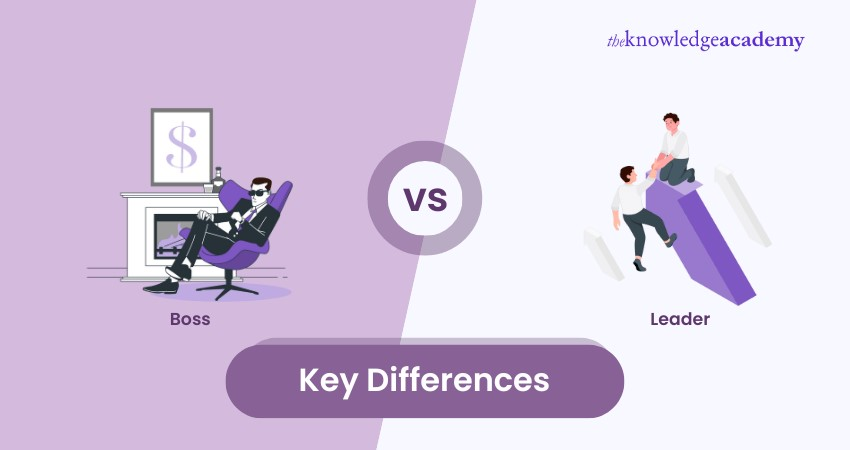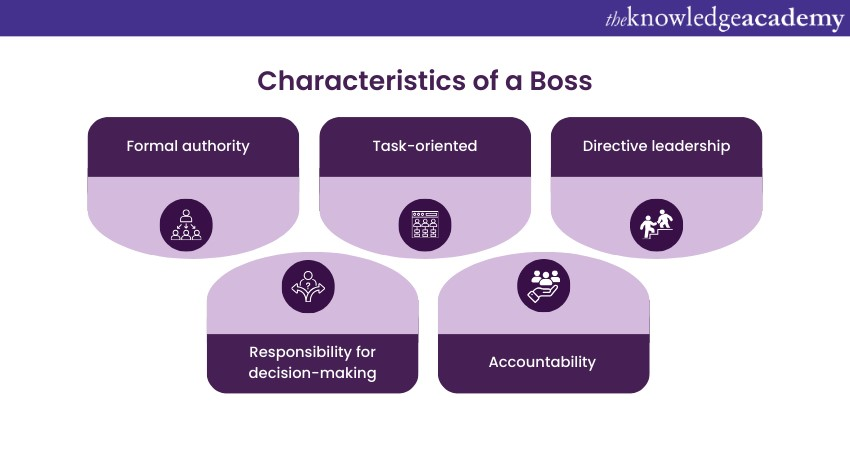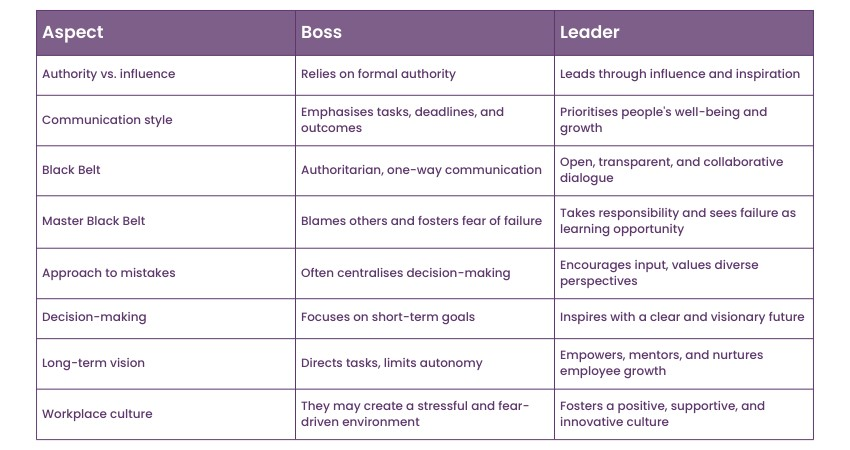We may not have the course you’re looking for. If you enquire or give us a call on + 1-866 272 8822 and speak to our training experts, we may still be able to help with your training requirements.
We ensure quality, budget-alignment, and timely delivery by our expert instructors.

In any corporate environment, the terms "Boss" and "Leader" are often used interchangeably, although they represent very distinct roles. While a Boss typically focuses on authority and control, a Leader inspires, motivates, and fosters growth. Understanding these distinctions is important for anyone seeking professional development and a thriving career.
Whether you are an aspiring professional or looking to assess your current work culture, it's essential to recognise the kind of leadership you are under. In this blog, we will delve into the critical differences between a Boss vs Leader, highlighting their roles and responsibilities to guide your career journey.
Table of Contents
1) Who is Boss?
2) Understanding who is a Leader
3) Boss vs Leader: Key Differences
4) Conclusion
Understanding Who is a Boss
A boss is essentially a supervisor who is responsible for managing employees in the workplace. Typically, there's no specific title for their role on an organisational chart. They can be defined as an individual who sets rules, assigns tasks, and oversees employees' activities.

A boss motivates employees to boost productivity and company profitability, monitors compliance with company policies, and enforces disciplinary actions when needed. Additionally, they work independently from the workforce, focusing on results and demanding high performance and quality work.
Understanding Who is a Leader?
A leader is someone who motivates and influences others to achieve goals through their actions (or even inactions). They might be a supervisor or manager, but what sets them apart are the qualities that inspire their team to reach their objectives. Just like "boss," "leader" isn't usually an official title in organisations.
Instead, it represents those in leadership roles who oversee other employees. The quality of a great leader is that they ensure that company goals are efficiently met without sacrificing their team's time, health, comfort, or rights.
Want to learn how to master People Management? Then sign up now for our Successful People Management and Team Leadership Course.
Boss vs Leader: Key Differences
Now that we have covered the fundamental characteristics of each role let's dive into the differences between a boss and a leader. Here they are:

1) Authority vs. Influence
Bosses often depend on their formal title and the authority that comes with their position to maintain control, expecting obedience within the organisation's hierarchy.
In contrast, leaders draw their influence from a deep understanding of their team, built through empathy and genuine connections. They inspire loyalty not through their title but by leading with purpose and conviction. Leaders mentor, encourage, and set an example of integrity and dedication, influencing others through their actions and commitment.
2) Focus On Tasks vs. Focus On People
A boss focuses primarily on tasks, deadlines, and outcomes. They often prioritise the assignment's completion over the well-being of their team members. In such environments, employees might feel like mere teeth in a machine gear, valued only for their productivity.
In contrast, a leader has a core focus on people. They understand that a satisfied workforce is crucial for achieving organisational goals. Leaders invest ample time and effort in understanding the strengths, weaknesses, aspirations, and concerns of their team members. By valuing employees as individuals, they create a supportive atmosphere where people feel appreciated and understood.
Take your leadership skills to new heights with our Leadership Skills Course - join today!
3) Blame vs. Accountability
Bosses often act as managers, making sure everyone stays on task and meets their monthly targets. While these responsibilities are part of leadership, they don’t capture the essence of what it means to be a true leader. Leadership and management differ significantly, especially with regard to accountability.
Bosses focus on holding others accountable, whereas leaders hold themselves accountable and encourage the team’s self-accountability. True leaders teach their team how to manage themselves, further building confidence and each employee’s support through this approach.
4) Communication Styles
The differences between a boss and a leader are quite stark when it comes to communication. Leaders foster open communication, sharing encouragement and advice while also listening and answering questions. They recognise each team member’s value to brings and ensure everyone's voice is heard.
In contrast, bosses often operate with a top-down approach. They tell others what to do without listening. This shuts out new ideas and discourages open dialogue. Many people see bosses as a dead end, communicating only the bare minimum with them. Leaders, on the other hand, create an environment where open communication thrives, leading to a team that is both engaged and innovative.
5) Long-Term Vision vs. Short-Term Goals
A boss often focuses on immediate, short-term objectives, directing their attention towards quick results, meeting deadlines, and fulfilling quotas. While this approach might bring temporary success, it rarely leads to sustainable growth or innovation. It can create a short-sighted organisational culture where decisions are made for immediate gains without considering long-term consequences.
In contrast, a leader operates with a visionary perspective, looking beyond immediate goals. Leaders have a clear, inspiring vision for the organisation's future and can articulate this vision to motivate their team towards shared, long-term objectives. They emphasise strategic planning and sustainable growth, encouraging creativity and innovation. This cultivates an environment where employees are motivated to think beyond short-term gains.
6) Impact on Workplace Culture and Employee Satisfaction
A boss may create an environment where employees feel stressed, undervalued, and hesitant to voice their opinions. This stifling atmosphere can lead to high turnover rates, diminished morale, and a lack of enthusiasm for work. Such a culture doesn't foster loyalty or a sense of belonging, making it difficult for employees to find fulfilment in their roles.
In contrast, a leader is compassionate and empowering, transforming the workplace into an ecosystem of collaboration and mutual respect. Employees feel valued, appreciated, and encouraged to share their ideas. Leaders inspire, mentor, and provide constructive feedback, fostering an environment of trust and mutual support.
7) A Boss Assigns Tasks While a Leader Delegates Authority
Some bosses just assign tasks and responsibilities, but a true leader delegates authority. Understanding the significance of effective delegation is crucial for enhancing your skills as a manager or supervisor.
By giving employees authority, you show that you trust their ability to handle tasks competently. This not only boosts their confidence but also motivates them to work hard towards completing the project efficiently.
Want to learn how various Leadership styles help organisations? Register now for our Leadership Training.
Conclusion
We hope you have learned the significant differences between a Boss vs Leader. Remember, your professional and personal growth can only happen in a workplace that allows you to express yourself and provides you with room to grow. Strive to be a leader who inspires others and surround yourself with individuals who encourage and support your journey. Your success is not just about reaching goals but also about the positive impact you leave on those around you.
Learn the best Leadership and Management skills with our Leadership and Management Skills Course - join now!
Frequently Asked Questions
Who Has More Power—a Boss or a Leader?

Exactly! A leader wields more effective power by earning respect through empathy and action, not just authority. They inspire change and innovation with an open mind, creating an environment where new ideas can flourish and everyone feels valued. This approach not only drives success but also builds a strong, cohesive team.
What Are the Three Main Differences Between a Leader and a Manager?

What are the Other Resources and Offers Provided by The Knowledge Academy?

The Knowledge Academy takes global learning to new heights, offering over 3,000 online courses across 490+ locations in 190+ countries. This expansive reach ensures accessibility and convenience for learners worldwide.
Alongside our diverse Online Course Catalogue, encompassing 19 major categories, we go the extra mile by providing a plethora of free educational Online Resources like News updates, Blogs, videos, webinars, and interview questions. Tailoring learning experiences further, professionals can maximise value with customisable Course Bundles of TKA.
What is The Knowledge Pass, and How Does it Work?

The Knowledge Academy’s Knowledge Pass, a prepaid voucher, adds another layer of flexibility, allowing course bookings over a 12-month period. Join us on a journey where education knows no bounds.
What are the Related Courses and Blogs Provided by The Knowledge Academy?

The Knowledge Academy offers various Leadership Courses, including Leadership Skills Training, and Leadership And Management Course. These courses cater to different skill levels, providing comprehensive insights into the Types of Directors in a Company.
Our Business Skills Blogs cover a range of topics related to Earned Value Management, offering valuable resources, best practices, and industry insights. Whether you are a beginner or looking to advance your Project Management skills, The Knowledge Academy's diverse courses and informative blogs have got you covered.
Upcoming Business Skills Resources Batches & Dates
Date
 Introduction to Business Analytics Training
Introduction to Business Analytics Training
Fri 11th Apr 2025
Fri 13th Jun 2025
Fri 8th Aug 2025
Fri 26th Sep 2025
Fri 21st Nov 2025






 Top Rated Course
Top Rated Course



 If you wish to make any changes to your course, please
If you wish to make any changes to your course, please


